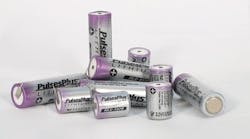Batteries for Wireless Sensors Deserve Some Thought
Wireless sensors are no longer a novelty, but they haven't found widespread use in most fluid-power applications, either. Most wireless sensors are used primarily for applications where they are difficult to access — either because of their remote location or because the sensor is buried deep within equipment. Another big advantage of wireless devices is potentially higher reliability, because wired connectors cannot corrode, break, or work themselves loose if there are none.
We recently published an article on such an application, where a pressure control valve with integral pressure transmitter had to be located in the cramped engine room of a dredging boat. Wireless communication was accomplished using a mobile phone and mobile app. Click here to read the article.
But regardless of whether the device is a sensor, transmitter, or two-way radio remote control, wireless components need batteries. Batteries are usually viewed as commodity items, so not much thought is given to their selection. But you might be surprised at the impact the choice of a battery can have. Picking the wrong one can jeopardize the reliability of the entire machine. After all, if a machine malfunctions because a short-lived battery has failed, users ultimately attribute the downtime and repair cost to the machine itself.
Our sister publication, Machine Design, recently published an article on considerations for specifying batteries for a wide variety of applications. It's a quick read, and you may surprised to learn how much you didn't know about batteries. Click here to read it.


